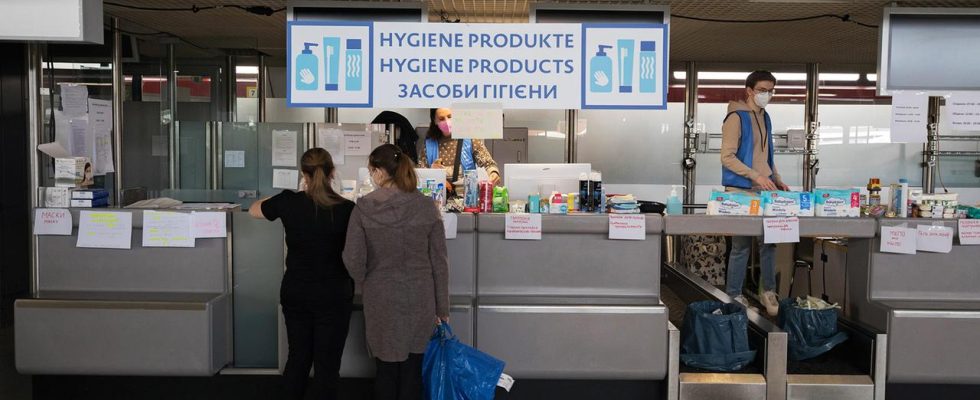Thousands of Ukrainian refugees have been living in Berlin for two years, torn between their new life and ever new bad news about the war in their homeland. And then there is the battle with the authorities.
About a dozen women sit around a few tables pushed together. They fled Ukraine. Some knit, others sew on buttons: oversized wool socks that can be buttoned up for soldiers back home, in Ukraine, who suffered serious foot injuries while repelling the Russian attack.
The war is always present here in the Intercultural House in Berlin-Schöneberg. In the office next door, the association “Schöneberg Helps e. V.” provides advice. Ukrainian refugees arriving in the capital, almost since the beginning of the war, says Anne-Marie Braun, co-founder of the association. The association helps with applications to the job center and with finding German courses, advises on child benefit or tax numbers, and helps with finding an apartment, daycare center, school place or doctor’s appointment.
People are traumatized by the war when they arrive here, says Braun. And then they would also encounter the German bureaucracy, especially in Berlin with its twelve districts. “These twelve districts are twelve kingdoms. This means that if you move from one district to the other, you have to fill out the entire Kladderadatsch again,” says Braun.
The war travels with you
Olena Mishchenko, for example, has just managed to retrain her nine-year-old daughter after moving with her family within Berlin – with the support of “Schöneberg Helps”.
Mishchenko fled from Poltava in central Ukraine to Berlin in March 2022. Her husband had already been working as a cook in the German capital for a while. She herself was still the director of an adventure park for children in Poltava when Russia launched its war of aggression.
Every day Mishchenko now calls or chats from Berlin with her parents in her old homeland – and with her sister. She lives in Dnipro, which Russia repeatedly bombards from the air.
“Basically, there is no longer a safe place in the whole of Ukraine,” says Mishchenko. It is a state of constant alert. Russia’s war is always present for them, even in Berlin.
Mishchenko has recently been working on a mini-job basis at “Schöneberg Helps”, for now. She makes coffee for newly arrived compatriots and gives initial information and tips while they wait for their consultation appointment.
Accommodation remains a problem
In addition to all the bureaucracy, finding accommodation remains a problem for many Ukrainian refugees, says Anne-Marie Braun from “Schöneberg Helps”. Especially in Berlin, where the housing market is already tense.
The State Office for Refugee Affairs estimates that around 50,000 Ukrainian refugees currently live in Berlin. And people are still fleeing Russia’s war to Berlin. There were just over 900 in January. Not nearly as many as in 2022, shortly after the start of the war, when there were more than 44,000 in March and April alone.
When, two years ago, many of the Ukrainian war refugees arrived in Berlin at the main train station, a number of Berliners opened their apartments. Not a permanent situation, that was clear from the start.
1,000 children and young people without a school place
“At some point you just don’t want someone sleeping on the sofa in your living room anymore,” says Braun. Many Ukrainian refugees are therefore still being accommodated in temporary accommodation at the former Tempelhof and Tegel airports. A problem especially for the children and young people who lived there because there was a lack of appropriate education and school options, says Braun.
Last week, Berlin’s Education Senator Katharina Günther-Wünsch opened the first new “welcome school” at Tegel Airport, initially with 130 places. There should be 300 by spring. Such a school is also planned at Tempelhof Airport.
In total, there are currently more than 1,000 refugee children and young people in Berlin without a school place, including many from Ukraine, says Anne-Marie Braun from “Schöneberg Helps”. The association recognized the problem early on and set up a kind of mini-school itself in May 2022 as a bridging measure: two groups with around 20 students each, who are taught by Ukrainian teachers according to the Ukrainian curriculum. Sports and German lessons are also on the curriculum there.
educational and Care offers
Learn German in order to arrive and at the same time continue traditions from Ukraine. The concept of “UKTAK” could be described a bit like this. “UK” stands for Ukraine “TAK” means “Yes” in Ukrainian. It is a project of around 35 volunteers, says project manager Kseniia Gashchak, who met through “Schöneberg Helps”.
“UKTAK” also organizes offers of help for Ukrainians. Around a hundred Ukrainian refugees come to them every month, also to the Intercultural House in Schöneberg, says Gashchak, who came to Berlin from Lviv in western Ukraine a year before Russia’s attack because her husband works here as an IT expert.
Allotment garden culture meets dacha tradition
At “UKTAK” they knit extra-large socks for injured soldiers and collect crutches, walkers and bandages for those injured in the war in Ukraine. Or they cook together, for example borscht, the typical Ukrainian beetroot stew.
And they even have a garden where people can grow cucumbers or tomatoes, pick fruit, mow lawns or prune trees. It’s so easy to talk to Germans – allotment garden culture meets dacha tradition.
This is particularly good for the refugee children, says project manager Gashchak: “It’s a bit like therapy.” Because the Russian war of aggression is always present – even in Berlin. They are safe here, but they can’t breathe a sigh of relief here either.

